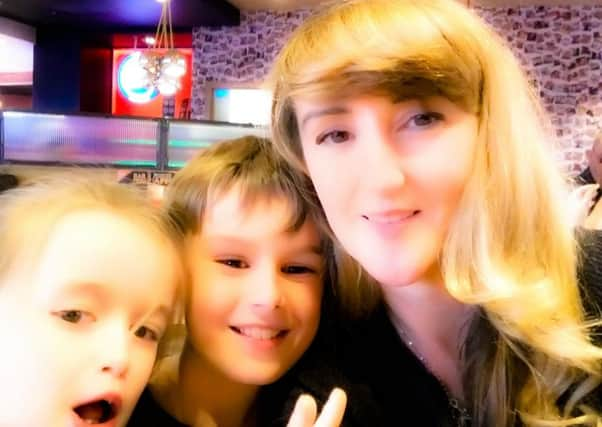My brain tumour nightmare


"Something’s not right,” muttered my boss. I had always suffered with headaches, but they were becoming worse. I’d been feeling sick, forgetting words and slipping into French.
I’d also forgotten how to send emails and write cheques. Everyone assumed I was having a breakdown. But the following day, when I was found holding a bag of iced peas to my head, my parents phoned my sister, Michelle, and her husband, Ian, both GPs. They suggested a brain tumour and told them to get me to hospital. In Royal Blackburn Hospital, I felt hot and paranoid. I was asked to repeat words and copy a doctor’s waving gesture.
Advertisement
Hide AdAdvertisement
Hide AdA torch was shone in my eyes. I wondered if the hospital cameras were focusing just on me. Would people be angry with me for wasting the hospital’s time? My mind was a jumble of paranoid, half-coherent thoughts. I was sent to lie in what looked like a giant, buzzing plastic pressure cooker. Hours later, doctors told me a CT scan had revealed a brain tumour.
I was transferred straight to the neuro ward in Royal Preston Hospital. My fellow patients were very ill – some partially blind, a few unable to speak and others paralysed. I smiled, thinking someone would breeze in and announce it had all been a huge mistake. But the following morning, a well-spoken young man introduced himself as my consultant. I had a meningioma – apparently the best type of brain tumour because it was so operable – but mine had become so big it was dangerous. In other words, it would kill me if they didn’t operate. I smiled and agreed to an operation five days later, but continued to think it was not real.
Reality dawned when I awoke a couple of days later with what felt like a shower cap sewn into my skull. Surgeons had drained the fluid around my tumour. My children, Thomas, seven, and Rosie, five, stared as if seeing a strange animal in the zoo. I became confused. “Am I dying?” I asked. “No. Go back to bed, Claire,” said the nurses, kindly. The day before the big operation, my consultant told me that if I could not communicate, I would have to use signs. “Raise your right index finger to tell me you are conscious, your left one for pain,” he said, quietly adding: “There will come a point when pain and consciousness meet, but we do not know when that will be.”
I was in theatre for 16 hours. I awoke to hear someone saying, “Michelle, Michelle”. A pale, calm face under a blue surgery cap swam into view. It took a few seconds for it all to register: Michelle was my sister, this was my consultant – and I was alive. I awoke again later, feeling as if my entire body was on fire – then remembered my consultant’s warning before sinking back into sleep. But the worst part by far was the hallucinations.
Advertisement
Hide AdAdvertisement
Hide AdAt one point, the faces of those around me on the ward seemed to shrivel up and die. This is it, I thought, grimly; I am in hell. A second later, the faces re-inflated, as if someone had pulled up a giant lever bringing everything back to life.
Paranoia followed. I kept my left index finger pointing upwards because this was the sign for consciousness. I thought every bang or overheard conversation was directed at me. I paced the ward, day and night. Relatives appeared – some of whom had flown in from abroad or driven from the other side of the country – but I was depressed, confused and rambling. My parents showed me photos of family holidays in Wales which triggered happy memories. But one night, at around 3am, I started to make a run for it, swiftly followed by a coterie of nurses, healthcare assistants and security guards. To an outsider, it must have looked like a scene from Benny Hill. Suddenly, I found myself in an eerie stairwell facing my consultant, who was repeating the words, “It’s all good”. But this seemed to do the trick; I consented to be taken back.
As I got stronger towards the end of my fortnight on the neuro ward, I noticed the staggering success of the neurosurgical procedures. One lady was unable to move from the neck down after a fall on the stairs. She used to joke about the metal brace drilled into her skull, calling it her ‘tiara’, but she recovered. Then there was the man who had fallen under a train and the woman in the bed opposite who collapsed at work. There was talk of bleeds on brains, motorway smashes, helicopter arrivals, falls off hills on bank holidays and different grades of brain tumour. All passed through the hushed, swishing confines of ward 2a. It was breathtaking to witness the sheer scale of life-saving neurosurgery, sometimes in the witching hours, in the pulsating, dimly lit corridors of this NHS hospital.
The day I left hospital, the sharp air and the harsh sunlight hit me instantly. I had to surrender my driving licence, so my parents had to drive me everywhere. I even had to be taught how to use a cashpoint and how to shop in a supermarket.
Advertisement
Hide AdAdvertisement
Hide AdMy sister, Michelle, who had seen the scan, told me she had thought no surgeon in the world would be able to save me.
My daughter, Rosie, went to school the next day and said, “I’ve got a mummy again.”
* Anyone wishing to donate to the neurosurgical ward can send a cheque payable to Lancashire Teaching Hospitals NHS Foundation Trust Charity (ward 2a) to Charitable Fund, Finance Dept, Chorley and South Ribble Hospital, Preston Road, Chorley PR7 1PP.